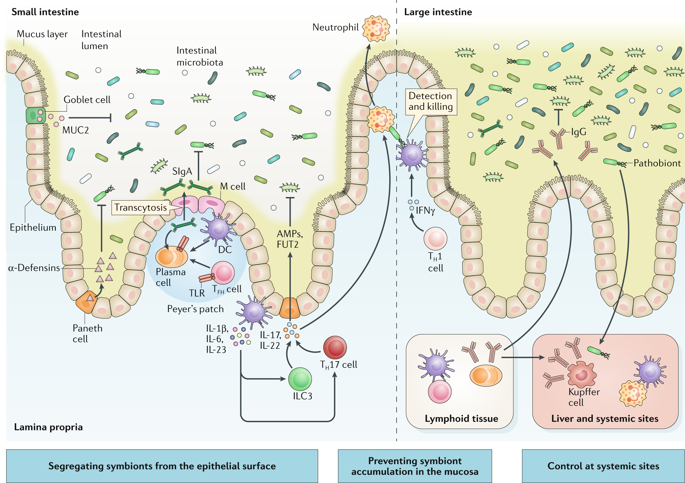当前位置:
X-MOL 学术
›
Nat. Rev. Immunol.
›
论文详情
Our official English website, www.x-mol.net, welcomes your
feedback! (Note: you will need to create a separate account there.)
Host-microbiota interactions in inflammatory bowel disease.
Nature Reviews Immunology ( IF 67.7 ) Pub Date : 2020-01-31 , DOI: 10.1038/s41577-019-0268-7 Roberta Caruso 1 , Bernard C Lo 1 , Gabriel Núñez 1
Nature Reviews Immunology ( IF 67.7 ) Pub Date : 2020-01-31 , DOI: 10.1038/s41577-019-0268-7 Roberta Caruso 1 , Bernard C Lo 1 , Gabriel Núñez 1
Affiliation

|
The mammalian intestine is colonized by trillions of microorganisms that have co-evolved with the host in a symbiotic relationship. The presence of large numbers of symbionts near the epithelial surface of the intestine poses an enormous challenge to the host because it must avoid the activation of harmful inflammatory responses to the microorganisms while preserving its ability to mount robust immune responses to invading pathogens. In patients with inflammatory bowel disease, there is a breakdown of the multiple strategies that the immune system has evolved to promote the separation between symbiotic microorganisms and the intestinal epithelium and the effective killing of penetrant microorganisms, while suppressing the activation of inappropriate T cell responses to resident microorganisms. Understanding the complex interactions between intestinal microorganisms and the host may provide crucial insight into the pathogenesis of inflammatory bowel disease as well as new avenues to prevent and treat the disease.
中文翻译:

炎症性肠病中宿主-微生物群的相互作用。
哺乳动物肠道内栖息着数万亿微生物,这些微生物与宿主以共生关系共同进化。肠道上皮表面附近存在大量共生体,这对宿主构成了巨大的挑战,因为它必须避免激活对微生物的有害炎症反应,同时保持其对入侵病原体产生强大免疫反应的能力。在炎症性肠病患者中,免疫系统进化出的多种策略被破坏,以促进共生微生物与肠上皮之间的分离并有效杀死渗透微生物,同时抑制不适当的 T 细胞反应的激活。常驻微生物。了解肠道微生物与宿主之间复杂的相互作用可能有助于深入了解炎症性肠病的发病机制以及预防和治疗该疾病的新途径。
更新日期:2020-01-31
中文翻译:

炎症性肠病中宿主-微生物群的相互作用。
哺乳动物肠道内栖息着数万亿微生物,这些微生物与宿主以共生关系共同进化。肠道上皮表面附近存在大量共生体,这对宿主构成了巨大的挑战,因为它必须避免激活对微生物的有害炎症反应,同时保持其对入侵病原体产生强大免疫反应的能力。在炎症性肠病患者中,免疫系统进化出的多种策略被破坏,以促进共生微生物与肠上皮之间的分离并有效杀死渗透微生物,同时抑制不适当的 T 细胞反应的激活。常驻微生物。了解肠道微生物与宿主之间复杂的相互作用可能有助于深入了解炎症性肠病的发病机制以及预防和治疗该疾病的新途径。






























 京公网安备 11010802027423号
京公网安备 11010802027423号